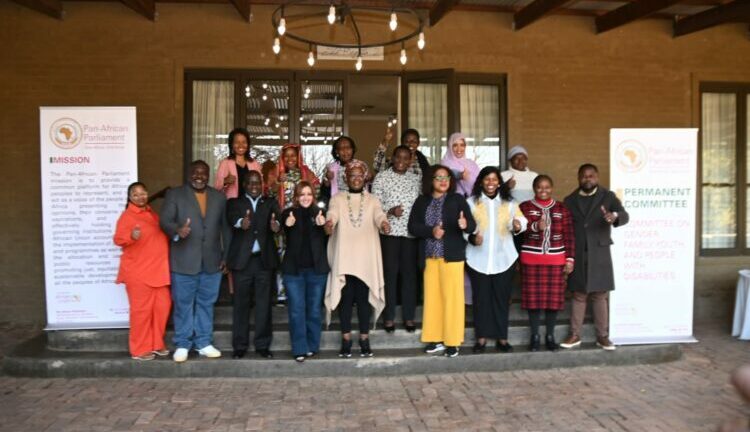
Members of the PAP Committee on Gender, Family, Youth and Persons with Disabilities | Source: spikedmedia - Photo: 2025
By Byron Adonis Mutingwende
Originally posted on spikedmedia.
PRETORIA, SOUTH AFRICA | 26 July 2025 (IDN) — A landmark step in Africa’s legislative journey toward gender justice was taken in Pretoria today, as the Pan-African Parliament (PAP) Committee on Gender, Family, Youth and Persons with Disabilities convened a high-level retreat to finalize and scrutinize the Model Law on Gender Equality and Equity in Africa. The session, hosted at the Blades Hotel, brought together parliamentarians, legal experts, youth leaders, consultants, and international partners for a deep engagement with what is widely regarded as one of the continent’s most ambitious normative frameworks on gender justice.
In an opening address that blended purpose and gratitude, Hon. Mariam Dao Gabala, Chairperson of the PAP Gender Committee, set the tone by welcoming participants to what she described as a pivotal moment in the Committee’s legislative mission. “This is not just a meeting,” she said. “It is a milestone in Africa’s legislative journey toward a more equitable society.”
Gabala emphasized the inclusive, collaborative process behind the model law, giving special mention to contributions from Namibia, the European Union, and the Italian Commission for Gender Equality. She also praised the presence of male allies in the process, noting that “gender equality has been built by men and women together.” Her remarks honored the unsung efforts of technical staff, legal consultants, and communication teams whose work made the retreat—and the law—possible.
A Law Rooted in African and Global Norms
Following Gabala’s address, Mr. Clement Mavungu, Legal Officer of the PAP, presented a detailed roadmap of the model law’s development and projected timeline for adoption. He explained that the law draws from a wide array of legislative frameworks, including African Union instruments, regional and sub-regional agreements, and international conventions such as those of the United Nations.
“We drew inspiration from progressive national laws and shared African values,” Mavungu said, stressing the importance of building a legal tool that not only promotes gender equality but also respects the continent’s cultural and political diversity.
He also highlighted how the draft law has kept pace with continental developments, referencing the recent adoption of the African Convention on the Elimination of Gender-Based Violence Against Women and the Girl Child—a development not yet in place during the early stages of drafting.
From Vision to Draft to Adoption
The model law was born out of the PAP’s formal commitment to gender equality as a legislative priority in October 2022. This led to months of background research, consultations, and legal analysis conducted by the Gender Committee between March and October 2023. The legal and political framework was adopted in late 2024, paving the way for drafting and subsequent refinement by a Technical Monitoring Committee in May 2025.
The version presented in Pretoria is now considered an “enriched” draft, ready for close examination by the Committee. Mr. Mavungu announced that, following this scrutiny, the model law will be submitted for first reading in the PAP Chamber on Tuesday.
Clear Roadmap Ahead
If passed in first reading, the law will proceed to regional consultations between July and October 2025, where feedback from member states, civil society, and grassroots stakeholders will be gathered. All proposed amendments will be considered before the final version is presented for full adoption at the November 2025 session of the Pan-African Parliament.
“This is a structured and inclusive process,” Mavungu affirmed. “We want every region and every voice to be heard before we make history.”
A Transformative and Adaptive Instrument
Both Gabala and Mavungu described the draft law as “fundamentally transformative,” not only in its ambition to end gender-based discrimination but also in its adaptability to diverse national and cultural contexts.
“This model law is designed to guide not just policy but behavioral change,” said Mavungu. “Its language is flexible enough to be contextualized without losing its core principles.” He highlighted provisions that touch on nutrition, education, political participation, and economic inclusion, asserting that the law goes beyond rhetoric to provide tools for systemic reform.
Gabala echoed this sentiment, calling the draft a “decisive turning point” for African women and vulnerable groups. “It answers an urgent need—to guarantee real and effective equality between women and men in every domain of life,” she said.
A Call to Ownership and Action
In closing their respective presentations, both Gabala and Mavungu issued a call to action. Gabala praised the dedication of Committee members who have “understood the meaning of their responsibility for the African population,” and encouraged them to remain actively engaged. Mavungu urged committee members to “take ownership of this law,” emphasizing its potential to become a “powerful vehicle for equality, justice, and inclusive development.”
As deliberations continue, a shared optimism permeates the gathering. There is a growing consensus that the Model Law on Gender Equality and Equity in Africa—if adopted and implemented—could mark a transformative chapter in the continent’s pursuit of justice, inclusion, and sustainable development.
With its strong legal backbone and broad-based support, the draft law is poised not only to shape national policies but to define Africa’s collective legislative stance on one of the most critical human rights issues of our time. [IDN-InDepthNews]

